Elephant in the room: Thailand’s troubling trend of wild attacks

A recent report by Thailand’s Department of National Parks, Wildlife and Plant Conservation revealed a troubling trend: Since 2018, wild elephant-related attacks have resulted in the deaths of at least 150 people, with over 133 reported injuries. The Humane Society pointed fingers at tourists for provoking these attacks.
The report highlights that elephants have been causing chaos on roads, encroaching into tourist areas, and even invading homes, turning Thailand into the world’s hotspot for elephant-related incidents. Many victims have been tourists in the southern region. The frequency of these encounters has surged over time, reflecting Thailand’s increasing challenges with wild elephants.
Aside from violent confrontations with humans, elephants have been observed blocking entire roads with their large herds, crushing vehicles, and menacing defenceless tourists before launching attacks.
In one notable incident, 50 elephants casually ambled across a highway in Chachoengsao, bringing traffic to a standstill. However, one motorist experienced terror firsthand when a seven-ton bull elephant decided to make itself comfortable by taking a seat in his car. The 34 year old elephant, known as Duea, nonchalantly wagged his tail before reclining on the vehicle in Khao Yai National Park.
According to local reports, provinces such as Nakhon Ratchasima, Phang Nga, and Hua Hin are experiencing a rise in human-elephant conflicts. Incidents have become so commonplace that residents are resorting to arming themselves with ping-pong “bombs” to deter the animals.
The Humane Society International suggests that the increase in elephant attacks is closely linked to their captivity. Thailand hosts many elephants employed in the tourism and logging sectors, with many others confined to zoos and circus-like environments.

Only a fraction of these majestic creatures reside in their natural habitats. Those held in captivity are often confined to small enclosures, restrained by ropes and chains, and coerced into performing tasks such as dancing, galloping, and carrying tourists on their backs to serve the financial interests of their handlers.
Animal rights activists have long decried elephant rides as a form of cruelty and torture. Groups like PETA argue that elephants working in captivity have been forcibly removed from their jungle homes and treated as commodities, forced to haul illegal logs or entertain tourists.
Adam Peyman, director of wildlife programs at the Humane Society International, urged tourists to be conscientious about their actions, reported The Daily Mirror.
“When people get injured or killed by elephants, of course, it’s a human tragedy but it’s important to understand the underlying abuse, exploitation or cruel treatment that the elephants have often endured that have led up to that unfortunate event.”
Peyman of the Humane Society International noted that instances of aggressive elephant behaviour often stem from elephants compelled to perform for tourists.
“This can lead to injuries or even fatalities for the elephants themselves, as well as for other elephants and people.”
Peyman also encouraged tourists to take a stand against such cruelty by abstaining from participating in these activities, asserting that they have a “key role to play.” Additionally, he attributed the surge in attacks to human greed, stating that human activities have led to a depletion of elephants’ natural habitats, consequently fostering competition for land and resources. As a result, elephants have been compelled to raid crops from farms.
“This in turn can spark violent retaliations such as throwing firecrackers or stones at a herd, that can lead to elephants learning to be fearful and defensive towards humans.”

Latest Thailand News
Follow The Thaiger on Google News:


























